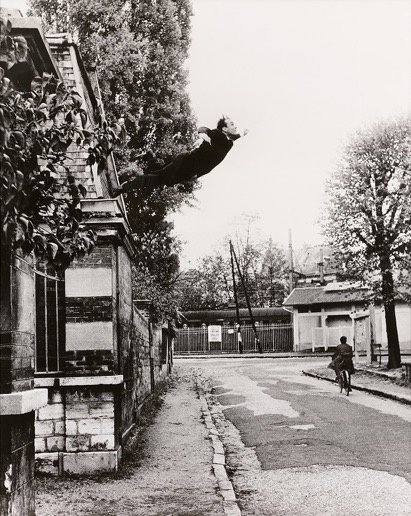TimelightZone

YVES KLEIN (1928–1962) IN COLLABORATION WITH HARRY SHUNK (1924–2006) & JÀNOS KENDER (1937–2009),
LE SAUT DANS LE VIDE [THE JUMP INTO THE VACUUM] (1960)
"Annonymous no more. SettlingInto."
Along Interstate 80W, just west of Ontario, Oregon, a roadside sign announces entry into a radically different space than any place east of there. I call it God's Own Time Zone, probably because I was born within its boundaries, which always amounted to pure fiction blended with both geographical science and politics, which tends to guarantee very strange bedfellows, indeed. The most conservative will wistfully recall that before The Gilded Age, these United States featured just one time zone, or, perhaps more accurately, an infinite number of them. When the sun reached its apex, noon appeared. This standard worked precisely the same everywhere on Earth, always had and presumably, always should. God's will. Ten miles further down the tracks, noon arrived a minute or so later. The emergence of land travel moving on average faster than a walking horse finally did in the old man's time, sparking a decades' long debate which was more like an international argument, culminating in the most outrageous encroachment upon human freedom and liberty in human history, the adoption of Greenwich as the prime meridian and calculating all local times relative to that baseline; mean time. The French, of course objected but still adopted the standard, though declaring their prime meridian Paris Mean Time, retarded from Greenwich by 9 minutes and 21 seconds. God must love the French! ©2021 by David A. Schmaltz - all rights reserved
Part of Oregon protrudes into The so-called Mountain Time Zone. Being a native Oregonian, I have never fully acknowledged those Mountain Oregonians as authentic natives, more like refugees from Idaho, but I digress. What precisely makes God's Own Time Zone special seems hard to nail down. Its inhabitants hardly seem homogenous because they aren't. They exhibit the same variety seen everywhere else: not just white, not purely Christian, not the White Bread Stereotype many associate with typical westerners, which never actually existed, though not for lack of trying. Oregon Territory's original charter prohibited Blacks and Chinese, and even tried to prohibit Oregon's Native Inhabitants, but those legal prejudices couldn't hold. They wanted to create an empire more than they desired a state, originally envisioning realizing the many benefits of liberty by denying many their freedoms, and that despotism never works for long. Oregon used to stretch east to what's now Nebraska's western border. Now it sits snuggly between California below and Washington above, with our home place just ten miles north of Oregon's northern border.
Now, more separates us than distinguishes us as similar. Stepping back into my home place feels like a small step backward in time as well as space, a TimelightZone visit. To The east, further west, north and south, civilization as we've come to know it continues to expand at a frantic pace. Denver has been adding thousands of move-ins a month for years and has grown into a region with millions of inhabitants. Same with Seattle. Farmland, prairie, and foothills continue being flattened for houses, which sell better than hotcakes. Each freeway exit seems cookie-cutter similar, featuring the usual national chain stores and ever fewer Mom and Pops, daming free enterprise. In this town, civilization was slowed by a decision the city fathers passed down early on. They refused the railroad's invitation to pass through this valley, leaving us relatively isolated. When freeways came, they, too, went somewhere else, following the railroad's lead. This single decision produced a place off to one side of time and space. I told The Muse, when I first met her, that I'd grown up in a Walt Disney movie in a house on the eponymously named Pleasant Street. When she visited, she nodded, "You were right."
In cities, The Muse and I learned, everything seems like a race, life itself seems in heated competition with itself. I never figured out who decided the winners and I never learned the rules. Here, where a crosstown trip in heavy traffic consumes all of about eight minutes, competition fades into the irrelevance it justly deserves. Some were shocked when the speed limit on some arterials was raised to thirty from twenty-five. I've always known that this town observes the one true and universal speed limit and I'm warmed to recognize that I'm back within it here in the Timelight Zone. This morning, sitting in our broad front window looking down Boyer Street, I recognized a man out performing his morning exercise. "Isn't that Jim?," I asked The Muse. She nodded that she thought it was, so I stepped out onto the porch and hailed him as he passed by. Exile provided not a single similar experience, but here in the Timelight Zone, it's a frequent occurrence. Annonymous no more. SettlingInto.


